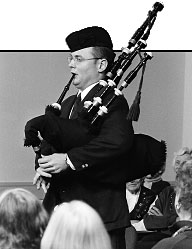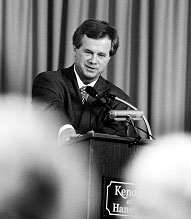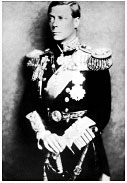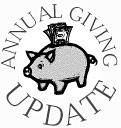Dartmouth-Hitchcock Medical Center Development
Insights from history
By Jonathan Weisberg
The regular exchange of ideas, activities, and people between Dartmouth and Hanover's retirement communities is typical of the many college towns that are also home to large numbers of retirees. It was no surprise, therefore, to find Dartmouth Medical School Dean John Baldwin, M.D., making a presentation at Kendal at Hanover— especially because a number of "Kendalites" are retired Dartmouth physicians and Kendal is home to many of DMS and DHMC's longtime supporters. Rather, the surprise was in the topic that Baldwin, a world-renowned cardiothoracic surgeon, chose for his talk.

|

|
|
When DMS Dean John Baldwin (left) spoke recently at Hanover's Kendal retirement community, home to many supporters of the institution, he offered pomp and ceremony in both the substance of his talk— about King Edward VIII (right)—and in the coda to the evening—a bagpipe piece composed by Edward and played by DMS student Travis Matheney (above). Photos: Mark Austin-Washburn Baldwin's interest in Edward began while he was a Rhodes Scholar at Oxford, which Edward had also attended. |
Echoing a thought on the minds of many in the audience, the evening's emcee, John Jenkins, posed a question during his introduction: Why was the dean of Dartmouth Medical School speaking about King Edward VIII? Baldwin's interest in the subject began while he was a Rhodes Scholar at Oxford, which Edward had also attended. He explained that his fascination with the royal scion lay in Edward's paradoxical status as a "historic but insignificant figure." He was someone who didn't have a great impact on the world, Baldwin said, but "about whom people seem to feel very strongly."
Baldwin stressed that he intended to neither defend nor criticize Edward, but rather to present an objective account of his life. This impartiality seemed appropriate from a scientist, and the audience listened attentively to the background of a man nearly all knew of, but not many knew well.
Baldwin challenged the audience to consider that history is basically biography and that one could therefore "formulate a study of British 20th-century politics using Edward as a vantage point. His biography is really a biography of transitions that have affected Western Europe from Victorian times through Margaret Thatcher." With this framework established, and the help of some slides, Baldwin launched into the biography:
Edward was born in 1894. The grandson of Queen Victoria, he was baptized on her knee and chris tened Edward Albert Christian George Andrew Patrick David. He would later be known briefly as King Edward VIII, and then for some time as the duke of Windsor, but to his family he was simply the last name on that list: David.
From the beginning, Edward's life was exceptionally public. He was the eldest of his siblings, and thus an heir to the throne, but also the brightest and most charismatic of his brothers, which intensified the attention he attracted. Baldwin pointed out that in 1911, when Edward was invested as Prince of Wales, many elements of the ceremony were invented particularly for that occasion. It was designed to be a spectacle for the British people, and Edward "found this a particularly painful experience."
Stopping at one slide, Baldwin pointed out the sadness in Edward's eyes, even as the young man stood posed in his finery, and advanced a thesis: "I think from this early age, if you look at his face, and particularly his eyes, you see a person who is looking for an exit." Baldwin admitted that this was his own "personal perspective on it. But I think if you follow his eyes in many of the pictures . . . you will [learn] more about this enigmatic person."
|
'Tis the set of the sails, and not the gales,
which tells us the way to go. |
As royalty, Edward's life was one of luxury. As a public figure, however, his life was not his own but subject to the whims of his father, the king. He sailed around the world many times as a representative of his nation and trained at the Royal Navy College, where he "thoroughly enjoyed the naval experience." But then his father decided Edward should have a genuine academic experience and so sent him to college. Edward didn't enjoy the role of student nearly as much. From 1912 to 1914, Edward attended Magdalen College at Oxford. The academic in Baldwin apparently couldn't resist studying Edward's essays and examination papers from this period. The dean's assessment of Edward the student: "I would say that he was a very good student, certainly above average, and that he made considerable progress while he was [at Oxford]."
This comment was one of many examples of the depth of study apparent in Baldwin's presentation. He repeatedly had obscure facts at his fingertips as he spoke, cited interviews with people who had known Edward, and made it clear that he'd thoroughly perused the written record. Many in the audience were struck that a physician could spend so much time and effort on a tangential issue. At the same time, though, because it was a nonmedical topic, Baldwin seemed to feel leave to take a light-hearted approach to his subject. He chose several amusing slides, such as one of Edward in the garb of a beefeater. This dual approach—both studious and humorous—helped convey Baldwin's understanding of Edward as a man stuck in the seriocomic role of gilded royalty—a man at once trivial and important.
By the time Edward left Oxford, World War I was imminent, and he was anxious to contribute to the defense of his nation and the fortunes of his family. However, despite specific, repeated requests, he was kept away from the front because of the value a hostage Prince of Wales would have had for the enemy.
With the return of peace in 1918, Edward began touring the globe as a "sort of worldwide spokesman for British products." He continued a largely insouciant existence of round-the-world travel, cocktail parties, and romantic liaisons until January of 1936, when his father, King George VI, died, and Edward became king.

|
|
Stuck in the seriocomic role of gilded royalty, Edward was at once trivial and important. |
Baldwin theorized that Edward "would not have been the king for a long period of time under any circumstances." He had accumulated too many enemies in the Buckingham Palace bureaucracy and was seen as too hard to control. Edward's desire to marry the twicedivorced Wallis Simpson became the means by which his reign was ended a mere 11 months later.
Baldwin recounted how Edward signed his abdication paper in the presence of his brothers, then was given the unique title duke of Windsor to fill the gap—for no one knew what to call a former king.
Soon after stepping down from the throne, Edward married Wallis Simpson. He spent much of the remainder of his life in Paris. He served the monarchy in a few posts and also was a board member for various large corporations. Edward's most meritorious service was as governor of the Bahamas for two years in the 1940s, where he instituted democratic reforms. However, he no longer fit into the structure of the monarchy, and most of his time was spent on the pursuits of the idle.
Edward died in 1972 of throat cancer. Here, Baldwin showed his medical interests, taking a moment to point out how often Edward had been pictured smoking.
To conclude his presentation, Baldwin introduced a final surprise —as the reedy notes of a bagpipe surged over his voice. DMS student Travis Matheney, an accomplished musician on the difficult instrument, brought the evening to a close by marching into the auditorium playing an original composition of Edward's. Edward had loved music, particularly the bagpipes, Baldwin noted.
As the lights came back on, it was clear the evening's program had provoked considerable discussion among the Kendal attendees. Some had further questions for Baldwin, and many shared their own memories of Edward. The event was deemed by Jenkins a "great program . . . different than expected and refreshing."
Annual Giving Update
By Lisa Webster Drucker
Director of Annual Giving

Dartmouth Medical School Annual Fund: As I write this in early May, we are heading into the final stretch toward our yearend goal and I'm happy to report that the DMS Annual Fund total has reached $292,000. But we still have more than $17,000 in outstanding pledges, so please make certain your payment reaches us by June 30. Annual giving remains one of the School's most important sources of funding for scholarships, while still allowing for flexible support of new initiatives like genetics. Please call me at any time at 603/650-4044 if you have questions or comments about the Annual Fund.
Dartmouth-Hitchcock Annual Fund: With but six weeks to go before the end of the fiscal year (as of this writing) and over $535,000 in hand, the Dartmouth- Hitchcock Annual Fund is closing in on our year-end goal of $571,000. We're now counting on some of our steadfast supporters to make their gifts by June 30 to help us to reach that goal. All gifts to the DHAF continue to be transformed into the diagnosis, care, and recovery of patients at Dartmouth-Hitchcock Medical Center and the advancement of new medical knowledge. If you would like to become a member of the Annual Fund, please call 603/650-4044.
A 1996 Dartmouth graduate, Weisberg is the magazine's editorial assistant.
Back to Dartmouth Medicine Summer 2000
